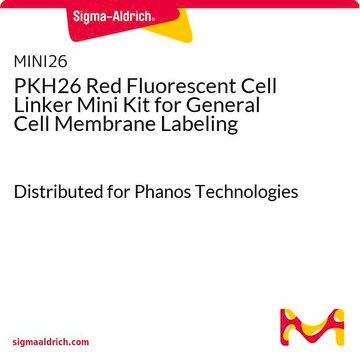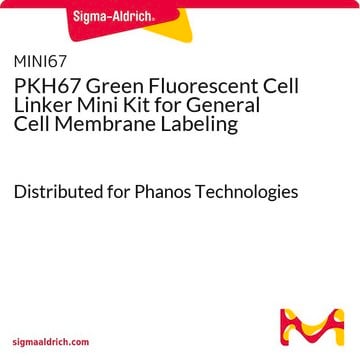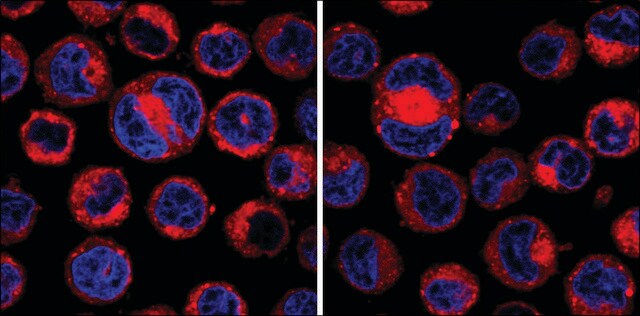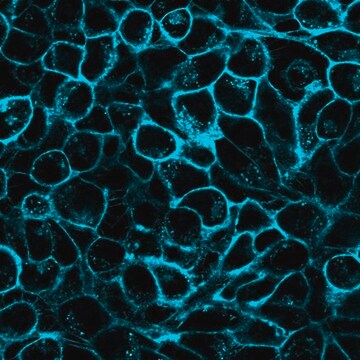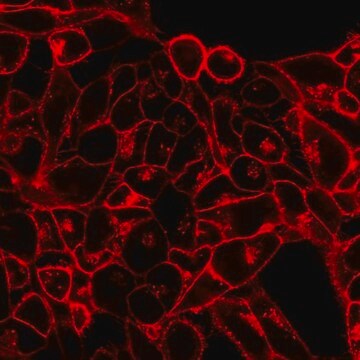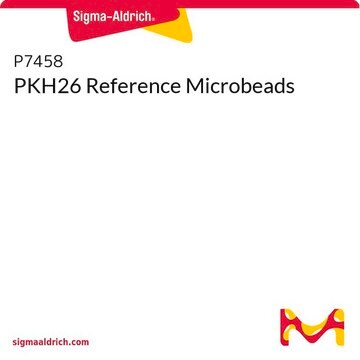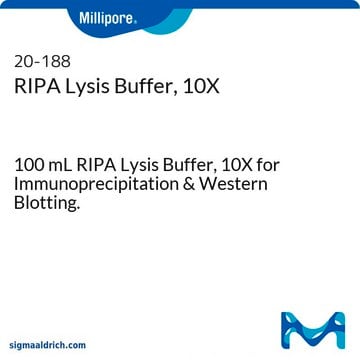CGLDIL
Diluent C for General Membrane Labeling
Distributed for Phanos Technologies
Synonym(s):
PKH diluent
Sign Into View Organizational & Contract Pricing
All Photos(1)
About This Item
UNSPSC Code:
12352207
NACRES:
NA.32
Recommended Products
Quality Level
form
liquid
storage condition
dry at room temperature
technique(s)
flow cytometry: suitable
application(s)
cell analysis
detection
detection method
fluorometric
shipped in
ambient
Application
Diluent C for general membrane labeling has been used for the complete dispersion of mesenchymal stem cells (MSCs) pellets. It may also be used as a general membrane labeling diluent with PKH26, PKH67 and CellVue® Claret fluorescent cell linker dyes.
Linkage
For additional technical details on PKH and CellVue® Fluorescent Cell Linker Dyes including an extensive bibliography, please visit here.
Legal Information
Distributed for Phanos Technologies, Inc.
CellVue is a registered trademark of Phanos Technologies
Kit Components Only
Product No.
Description
- Diluent C 6 vial(s)
Certificates of Analysis (COA)
Search for Certificates of Analysis (COA) by entering the products Lot/Batch Number. Lot and Batch Numbers can be found on a product’s label following the words ‘Lot’ or ‘Batch’.
Already Own This Product?
Find documentation for the products that you have recently purchased in the Document Library.
Customers Also Viewed
Yu Peng et al.
Journal of cellular and molecular medicine, 25(21), 10049-10060 (2021-10-10)
Liver fibrogenesis is a dynamic cellular and tissue process which has the potential to progress into cirrhosis of even liver cancer and liver failure. The activation of hepatic stellate cells (HSCs) is the central event underlying liver fibrosis. Besides, hepatic
Phenotypic plasticity of mesenchymal stem cells is crucial for mesangial repair in a model of immunoglobulin light chain-associated mesangial damage
Herrera GA, et al.
Ultrastructural Pathology, 42(3), 262-288 (2018)
Lei Wu et al.
Frontiers in immunology, 11, 1934-1934 (2020-10-06)
Long non-coding RNA (lncRNA) is pivotal for multiple sclerosis (MS), but the potential mechanism of lncRNA PVT1 in MS animal model, experimental autoimmune encephalomyelitis (EAE) still remains unclear. In this study, macrophages were firstly isolated and induced to polarize into
Milad Riazifar et al.
ACS nano, 13(6), 6670-6688 (2019-05-24)
To dissect therapeutic mechanisms of transplanted stem cells and develop exosome-based nanotherapeutics in treating autoimmune and neurodegenerative diseases, we assessed the effect of exosomes secreted from human mesenchymal stem cells (MSCs) in treating multiple sclerosis using an experimental autoimmune encephalomyelitis
Ahmed Elsherbini et al.
Acta neuropathologica communications, 8(1), 60-60 (2020-04-30)
Amyloid-β (Aβ) associates with extracellular vesicles termed exosomes. It is not clear whether and how exosomes modulate Aβ neurotoxicity in Alzheimer's disease (AD). We show here that brain tissue and serum from the transgenic mouse model of familial AD (5xFAD)
Articles
PKH and CellVue® Fluorescent Cell Linker Kits provide fluorescent labeling of live cells over an extended period of time, with no apparent toxic effects.
Our team of scientists has experience in all areas of research including Life Science, Material Science, Chemical Synthesis, Chromatography, Analytical and many others.
Contact Technical Service